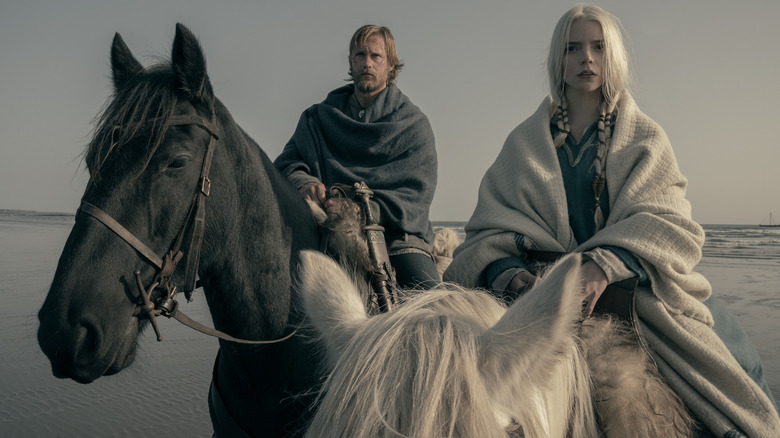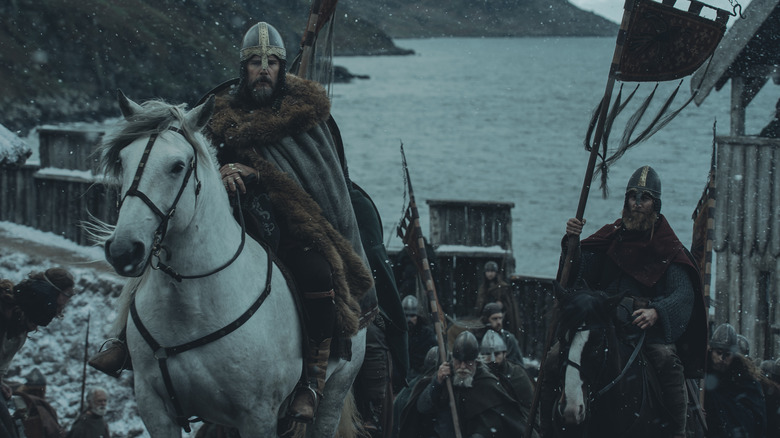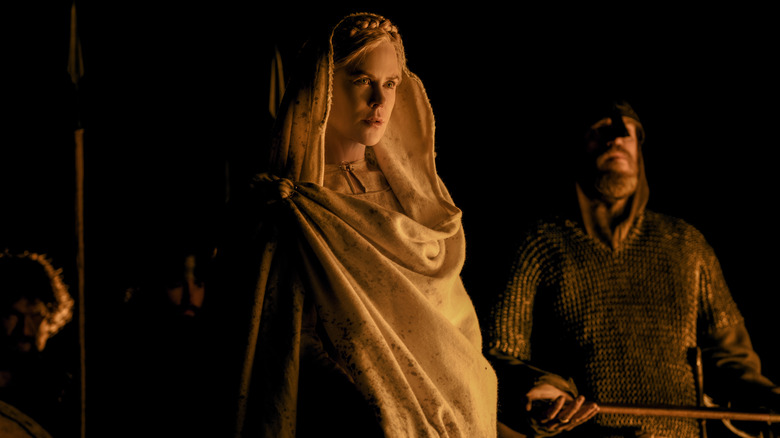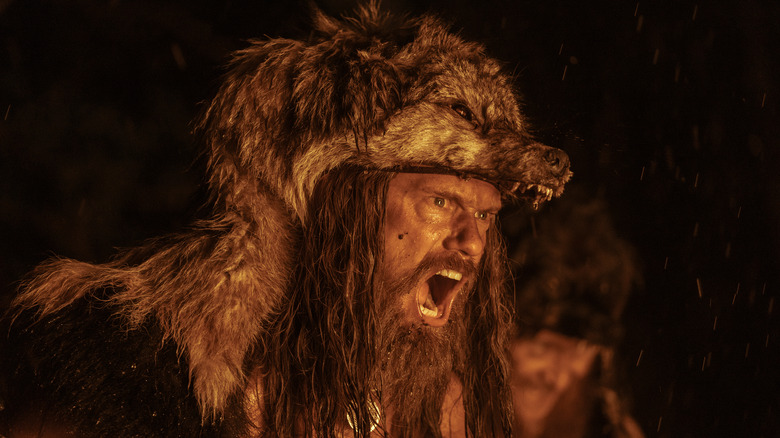The Northman Spoiler Review: Robert Eggers' Most Disappointing Movie Still Rules
Iceland's hottest new club is "The Northman." Located at the Gates of Hel, this place has everything: Ethan Hawke acting like a dog, nude sword fights in the middle of a volcanic eruption, sudden bursts of incest, grumpy reanimated corpses, Willem Dafoe telling sex jokes before being killed off-camera, Björk with no eyes, and an ethereal Anya Taylor-Joy using a Dracula accent. Actually, "The Northman" is the latest from Robert Eggers, the esoteric filmmaker who has quickly made a name for himself helming strange, detailed films set in the past. After three movies, Eggers' modus operandi has taken shape: he specializes in stories of repressed, tormented characters who dwell in time periods long gone. These characters frequently crash against tradition and the expectations of their particular era. "The Witch," Eggers' nightmarish debut, dealt with a Puritanical family in the 1600s tormented by both their slavish devotion to their repressive faith and dark supernatural forces. "The Lighthouse," Eggers' second feature, trapped Robert Pattinson and Willem Dafoe on an island in the 1890s, and had them slowly go insane while seemingly fighting off their own urges and neuroses.
Now we have "The Northman," Eggers' biggest movie yet. It once again deals with characters from a bygone era — specifically, the late 800s. And once again, Eggers has his characters butting up against the traditions and expectations set by their faith and era. Like his previous two movies, "The Northman" is loaded with symbolism, surreal happenings, and bursts of horror. All the pieces are in place. And yet ... this is Eggers' most disappointing film.
It is to the director's credit that his first true stumble (I maintain "The Witch" and "The Lighthouse" are both phenomenal) is still a damn good movie. It just could've been better. It could've been more ... Eggersy (for lack of a better term). Working with a big cast and a big budget meant Eggers had to adhere to studio notes. By the filmmaker's own admission, this was the first of his movies that he had to go back and recut due to poor test screenings. This resulted in Eggers adding additional dialogue to clarify certain things that left test viewers puzzled. And while Eggers states that the theatrical cut of the movie is his "director's cut," there's a part of me that really wants to see the pre-test audience version of the film. Because I have a feeling deep in my bones it's weirder, and better, than the film that is now playing in theaters.
This is going to be weird and violent!
For "The Northman," Eggers is drawing on the ancient Scandanavian legend of Amleth, which heavily inspired Shakespeare's "Hamlet," and, in turn, "The Lion King." As a result, watching "The Northman" can often feel like an ultra-violent "Lion King"-"Hamlet" mash-up. The story concerns a prince who plots revenge after his uncle murders his father and takes over the throne. Like I said: "Hamlet" by way of "The Lion King." The prince is Amleth, played by Oscar Novak as a child and Alexander Skarsgård as a hulking, blood-drenched adult. Amleth's father, King Aurvandill War-Raven (Ethan Hawke), wants to impart his kingly wisdom to his son. But before he can do much of that, he's murdered by his brother Fjölnir (Claes Bang). The young Amleth watches in horror first as his father is killed, and then as his mother, Queen Gudrún (Nicole Kidman), is carried off over Fjölnir's shoulder like a piece of meat. His life in danger, Amleth flees his home, but vows to return one day to "avenge father, save mother, [and] kill Fjölnir."
Eggers establishes all of this with his keen eye, creating a cold, dirty, bleak world lit by flickering fires and murky skies. He also isn't afraid to get weird early, staging a ritualistic scene between young Amleth and his father, overseen by Heimir the Fool (Willem Dafoe). This involves a drug trip of sorts, complete with a vision of a literal family tree upon which all of Amleth's decedents hang like rotten apples. This is followed by the violence of Aurvandill's death coupled with the ravaging of Amleth's village, complete with women tossed from great heights only to smash into the ground, and children ripped from their mothers. Eggers is making it clear from the start: this is going to be weird and violent! And yet, "The Northman" is also Eggers' most accessible film. It follows a rather straightforward path; a revenge narrative where everything happens more or less exactly as you think it will. But it's the lurking strangeness that makes "The Northman" really stand out.
Years later, Amleth, now all grown up in full berserker mode, learns that Fjölnir's stolen kingdom was quickly stolen in return. Fjölnir now lives in exile in Iceland. Now is the time for revenge, spurned on by a vision by an eyeless witch, played by Björk in a memorable cameo. Off Amleth goes, posing as a slave. He quickly befriends another slave, Olga, who seems to be a witch herself. She's played, appropriately enough, by Eggers' "Witch" star Anya Taylor-Joy. Taylor-Joy's role here is ultimately smaller than you might expect, but she makes every moment of it count. With her snowy-pale skin and unique, intense eyes, Taylor-Joy has built a distinguishable brand for herself just like Eggers, and they work well together. Custom dictates that Olga and Amleth fall for each other, and why shouldn't they? Skarsgård and Taylor-Joy are both preternaturally attractive people! Unfortunately, they don't have much chemistry. This is primarily due to how Skarsgård plays Amleth: a hulking, monosyllabic killer frequently shirtless while covered in gore and filth. It's right for the role, but it doesn't exactly lend itself to romance. Then again, it might, depending on who you ask.
Mound Dwellers, drug trips, and incest
When Amleth and Olga arrive in Fjölnir's new home, Amleth catches glimpses of his mother. She's married to Fjölnir now, and the two of them even have a young son (Elliott Rose). None of this bothers Amleth: he's convinced his mother is only going along with all of this because she has no choice. And he's here to rescue her! Thus the stage is set for what begins to feel like a video game, as Amleth moves from one quest to the next to enact his revenge. First, he fights a gigantic corpse known as The Mound Dweller, and it was here I truly perked up. The design of this sword-wielding zombie is wonderful, all ghoulish delights and practical make-up. But Eggers does a curious thing here: after the fight has ended and Amleth has won, a quick bit of camera trickery reveals the corpse hasn't moved at all. It was all seemingly in Amleth's head, just like the vision of Björk.
This ultimately bothered me. There are more than a few supernatural moments in "The Northman," but Eggers needlessly adds a bit of an asterisk to all of them, revealing they're not really happening, they're just part of Amleth's fevered mind. I assume that Eggers was going for a touch of realism while keeping fantastical elements in play — but why? Why not allow the supernatural to simply exist, as it did in "The Witch" and "The Lighthouse"? It feels like hedging; as if the filmmaker was worried the movie might get too supernatural. But that's exactly what I was hoping for.
Olga and Amleth continue to terrorize the village. Olga drugs some guards to the point that they begin self-mutilating themselves during a bad trip; Amleth murders people and stages their severed limbs in artistic poses; the body count rises, and concerns grow. And then the film's most interesting, if predictable, twist arises. Finally confronting his mother, Amleth is shocked to learn that Queen Gudrún is not some hapless victim. She reveals she has no love for Amleth's slain father. In fact, she hated him, as she was once his slave before their union. She encouraged Fjölnir to murder Aurvandill. And just to make this entire thing extra unpleasant, she plants a big romantic kiss on her long-lost son and tells him that if he wants, he can kill Fjölnir and she can serve as Amleth's queen. After Amleth rejects this, Gudrún turns on him, and freely admits she wants her son dead.
There's a lot to unpack here. Revealing that Gudrún was in on Aurvandill's murder is a great twist, and while the mother-son smooching is designed to make us all uncomfortable, it wasn't exactly unheard of at the time and in the culture that these characters exist. Kidman, never one to miss some good scene-chewing, really leans into her heel-turn. And her incestuous suggestion to Amleth just raises more questions. Was she really in on Aurvandill's death? Does she really love Fjölnir? Or is she doing everything she can in order to survive in a harsh world? It's a great moment, and the movie could've used more like it. Alas, there's action to be had!
Destiny
There's a lot of action in "The Northman." But Eggers doesn't seem entirely comfortable with it. The fight scenes are staged in long shots, usually filmed wide. That's great, in theory! So many modern movies blur their action with quick cuts and incomprehensible visuals. Showing it all is commendable. The problem is that Eggers' approach often leaves a lot to be desired. While plenty brutal, the action is frequently unconvincing. Clubs don't connect with skulls as hard as they should. Swords don't slash close enough to skin. While it makes sense that the action should be lumbering and unchoreographed — these characters are Vikings, not ninjas — the end result is consistently unsatisfying. For a movie that seems to pride itself on its brutality, "The Northman" is lacking in bite.
Still, Eggers is strong enough of a filmmaker to overcome these issues. And to his credit, the final fight between Amleth and Fjölnir is staged brilliantly, with the two men completely nude and fighting against flowing lava from an erupting volcano. In the end, like so many other Eggers characters before, Amleth cannot escape his fate. He is a man who lives by violence, and so he must die by it as well. There's a brief moment of hope — Olga reveals she is pregnant with Amleth's child, and Amleth has a vision that she's actually going to have twins. Amleth and Olga have a chance to run away together and live happily ever after — but Amleth cannot. He must kill. And kill he does. First, he kills his mother. Then he kills his half-brother. Then he and Fjölnir fight, both dying in the process. It's a fitting ending.
Eggers' attention to period details remains superb, and when he's allowed to unleash weirdness, it's wonderful (Willem Dafoe's skull pops up midway through the film to offer Amleth some advice, for instance). The cast is solid through and through, be it Hawke's rough and vulgar king, Skarsgård's brooding killer, Taylor-Joy's otherworldly witch, or Kidman's hammy queen. I also appreciated how understated Claes Bang is as Fjölnir — he refuses to play the character as a sneering villain. Why, then, with all this good, does "The Northman" lack the punch of Eggers' previous works? The only logical answer is studio interference to make the film as accessible to the mainstream as possible. Again: Eggers swears this is his preferred cut, and I will take his word for it. But I am convinced there's a better version of this movie out there somewhere. Perhaps we'll get to see it someday.



